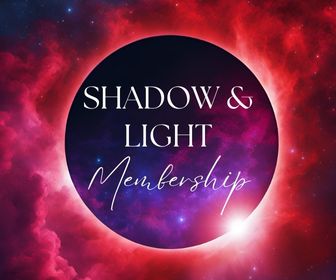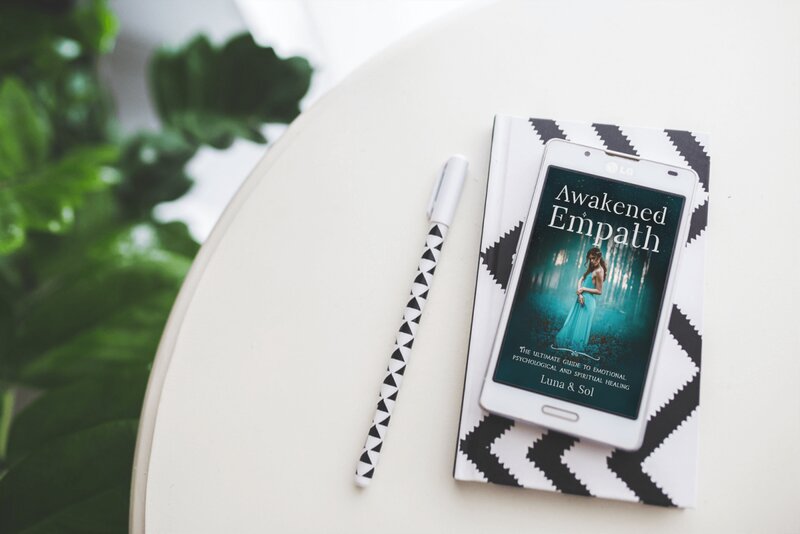We all have the capacity to sense the emotions, thoughts, and physical sensations of others.
Yet in our fast-paced and chaotic world, most of us have grown numb to this innate human ability.
Our diets, work habits, lifestyles, and environments all have an impact on our ability to not only feel connected to others, but also to ourselves.

Spiritual Wanderer Course:
⭐️⭐️⭐️⭐️⭐ "I started the Spiritual Wanderers Course a short while ago and for the first time in twelve years I have started to experience love, acceptance and compassion for myself and within myself. Thank you so much." – Vivienne S.
However, there is one type of person who never loses touch with their innate sensitivity.
This person is known as the Empath.
But while the Empath is a highly perceptive and receptive person, they are prone to experiencing energetic overload every day.
This emotional and mental baggage can lead to a lot of physical and psychological disorders such as depression and chronic fatigue.
If you’re a sensitive person curious to discover whether you’re an Empath, this page will share with you everything you need to know.
Table of contents
What is an Empath?

Put simply, an Empath is a person who absorbs other people’s emotions and experiences these emotions as if they were their own.
Empathic people are highly sensitive to the emotional climates around them and often take on the psychological baggage of other people. This often leads to chronic mental and physical sicknesses.

Shadow & Light Membership:
⭐️⭐️⭐️⭐️⭐ "Receiving these messages is a beacon of light and hope for me in currently very challenging times. The words of wisdom speak right to my soul, guiding and encouraging me further on my path. I highly recommend Shadow & Light to everyone who seeks to develop and cultivate a relationship with the Inner Self." – Karin
12 Signs You’re an Empath

Common signs of being an empath include:
- The tendency to soak up other’s emotions (and even physical sensations) like a sponge
- Strong intuitive abilities or claircognizance
- Unexplained fluctuating emotions
- Attentiveness to the needs of others
- Intense sensitivity
- High creativity
- Inability to watch violence
- Tendency towards anxiety and addiction
- Tendency to attract wounded people
- Gentle and caring nature
- Fatigue when being around lots of people
- Drawn to healing professions
How many of these signs can you identify within this list? Have I missed any?
Empaths & Spiritual Awakening

Undergoing a spiritual awakening and discovering that you’re an Empath often go hand-in-hand. Why?
When we begin soul searching, we start to uncover deeper truths about ourselves.
We begin to discover who we truly are, find our meaning of life, and stay authentic to our needs and dreams.
Realizing that you’re an Empath can help you to reconnect with your True Nature and true north. It reminds you of your strengths, weaknesses, and core essence.
In fact, discovering that you’re an Empath can help you to finally accept who you are, gifting you with self-love and a newfound determination in life.
This single discovery can be a form of spiritual healing in and of itself!
The Science Behind Being an Empath

What is it that enables us to experience empathy – to feel or share the same emotions as another person such as sadness, fear, joy, or any other type of emotion?
One possible scientific explanation for why Empaths are so receptive is the discovery of mirror neurons.
Would you like to save this?
Your information will never be shared.
Basically, we all have a set of neurons in our brains that fire up whenever we witness something that another person feels or experiences.
These mirror neurons help us to learn through imitation. When we are young, for example, we primarily learn to speak and behave through imitation of our parents and siblings.
Mirror neurons play a role in our biological growth and survival.
Essentially, mirror neurons create a neuro-physical link between us and other people.
Studies have shown that simply the act of watching another person pick something up triggers the same areas of our brain as the other person’s brain.
The discovery of mirror neurons has massive implications for Empathic people.
Such a discovery reveals why Empaths feel extreme disgust, pain, and horror when watching acts of violence whether in real life or on the internet.
Mirror neurons also hint at why Empaths carry so much emotional deadweight from others.
How to Become an Empowered Empath

When we can literally feel the pain of others (or close), our lives can become rollercoaster rides of extreme highs and lows.
However, the ability to experience the suffering of others also opens us up to the deeply vital emotions of compassion and love.
Being an Empath is only a curse when we have a weak sense of self, poor barriers, and a tendency to resist or attach to the emotions we experience.
The key to becoming a healed and empowered Empath lies in working to developing an individuated identity, clear boundaries, and non-attachment/resistance to emotions.
The first step in becoming a mature Empath is to learn how to ground yourself in your body firmly.
Examples of practices that all Empaths will find beneficial include:
- Mindfulness exercises
- Yoga
- Meditation
- Qigong
- Breathwork practices
- Progressive muscle relaxation
- Body awareness
- SOAR
Any technique that can help you get out of your mind and into experiencing the present moment with non-judgment and non-resistance will help you as an Empath.
Dark Empaths (the Shadow Side)

With all this talk about compassion and energy sensitivity, we might be inclined to perceive Empaths as some kind of modern-day saint.

Inner Work Journal Bundle:
⭐️⭐️⭐️⭐️⭐ "I highly recommend this. Each journal is beautifully designed, with ample room for reflection and gorgeous supporting images and quotes. Anyone who uses these journals is likely to experience a priceless payoff." – D
But it’s important to remember that Empaths are regular people, they’re just more sensitive to the inner world of others.
Furthermore, being an Empath can sometimes be misused to harm ourselves and others.
Depending on one’s background, life experience, and core wounds, it’s possible for an Empathic person to:
- Use their gifts to manipulate people
- Cover up their covert narcissism
We all have the ability to emotionally blackmail others. And according to psychology, some level of narcissism is healthy (1).
But sometimes, Empaths can ‘give in to the dark side,’ especially in the face of trauma and abuse.
Also, not all Empaths have genuine empathy. Yes, they may pick up on the emotions of others. But that doesn’t automatically mean they have the ability to show compassion for others.
In this case, we have a phenomenon that I call ‘Empathic narcissism‘ – also known as a closet narcissist or Dark Empath.
Such people appear gentle and vulnerable on the surface. But underneath the Empathic facade is a person who believes that:
- they are more special than others,
- can’t deal with criticism,
- craves admiration and validation,
- can’t see from other’s perspectives,
- are vindictive, and
- sees the world from a self-centric point of view
Being an Empath is a gift. But it must coincide with inner work and the ability to open one’s heart to others for it to be valuable and healthy.
How to Heal and Stay Balanced as an Empath

People. Faces. Words. Meanings. Feelings. Sensations. Energy. Pain.
We Empaths can feel it all, and it can make us sick to the core.
Here’s how to find healing and balance as an Empathic person:
1. You don’t have to take responsibility for other people
If you’re an empath, you’re finely tuned to the pain of other people, tending to internalize it as your own.
Remember that there is only so much you can genuinely do to help other people. Of course, you can try to help them or guide them as much as you see fit, but at the end of the day, the person experiencing the original pain must be willing to help themselves for any true healing to occur.
Often our caring natures blind us to the fact that many people don’t want, or aren’t prepared to be fixed because they are content in the safety of their misery.
2. Let yourself feel your feelings
It sounds counter-intuitive doesn’t it: “feel your feelings,” “face your pain”?!
But it’s a very important step to releasing the pent-up energy inside of you.
When we are preoccupied with escaping, repressing, and avoiding our pain, we perpetuate the cycle of our suffering.
Rather than giving in to the temptation to run – stop – be still. Sit down and let yourself feel the fatigue, the confusion, the anger, the hurt. Breathe through it. Journal about it.
Only once you face the truth of the pain you feel can you then progress to the next stage of letting the suffering go.
3. Realize that you might be projecting your pain onto others
Let’s be honest here. Part of the appeal of identifying as an empath is that it sometimes provides a doorway of escape to us; an opportunity to pin the blame on others.
Yes, you might soak up the emotions of others like a sponge, but that doesn’t mean that you are exempt from creating, and deeply experiencing, your own emotions.
It is all too easy to portray ourselves as victims in life, and much harder to take responsibility for our own happiness.
A key realization on the path of healing as an empath is to learn to distinguish what WE are feeling from what OTHERS are feeling.
And there isn’t always a clean cut distinction.
Often you will find that you are feeling about 45% of the emotions, and others are feeling about 55% of the emotions, or you might be feeling 20% and others 80%, and vice versa.
4. Be mindful of your self-talk

Empaths with low self-esteem will suffer much more than those with healthy and balanced self-esteem. Obvious? Perhaps. But not always.
Being an empath can be confusing, and it can be very easy to blame the hopelessness and worthlessness we feel on the bombardment of stimuli we experience every day.
It helps to realize that the more love, respect and trust you develop in yourself, the less you suffer, and that thoughts such as “I’m cursed,” “I’m so weird and different from everybody,” “I hate being an empath” and so forth, are all often products of low self-esteem.
5. Being an Empath is not the same as having empathy
This was very difficult for me to learn. “I must have lots of empathy if I’m an empath, right?” was the assumption I used to make. But I was wrong.
For over a decade, we've strived to make this website a haven of free, valuable information. Imagine a world where this knowledge wasn't readily available. If this post sparked a meaningful insight or helped you in any way, please consider a donation as a heartfelt "thank you" for keeping this resource free. Every contribution, big or small, allows us to keep giving back.
Thanks to my emotionally stunted upbringing I was a very sensitive child … and yet I lacked a lot of empathy for other people.
Empathy is not pitying someone; it is not feeling sorry for people and wanting to help them. No.
Empathy is the ability to look beyond the superficial façade of what a person says and does, understand their situation, and understand their behaviors, beliefs, feelings, and values.
Having empathy is about understanding people and showing compassion. In the words of empathy revolutionary Roman Krznaric, it is about taking an “imaginative leap into the shoes of another.”
Empathy is very much an intellectual and emotional experience combined, whereas being an empath is a kinesthetic, physical, and emotional experience.
Yes, you might be able to share the feelings of another, but that does not necessarily mean that you understand the other person on a level deeper than emotions.
Realizing that being an empath does not equal empathy helped me to grow immensely as a person.
6. Shielding isn’t a very helpful technique
As a temporary technique, shielding can be helpful, but it is not a long-term solution. I’ve written about shielding to “protect” yourself before and how it uses the language of victimhood which is counterproductive to becoming a healed empath.
Shielding is essentially about resisting ether people’s energy and resistance only serves to continue the cycles of fear and pain within.
Rather than fighting, open yourself. Allow yourself to experience the emotions, but also let them pass by not adopting them as yours. This takes time and practice. But non-attachment is a much better long-term solution.
7. Catharsis and body-mindfulness = useful techniques
As an empath, it is so important that you incorporate some consistent form of catharsis into your everyday routine to rid yourself of the stuffy energy you might be harboring.
Favored forms of catharsis among empaths include keeping a journal/writing, meditation, walking, and jogging.
Other forms of catharsis include singing, dancing, screaming (privately), laughing, and crying.
It is also extremely beneficial as an empath to teach yourself how to get in touch with your body – I call this “body-mindfulness” or “somatic mindfulness.”
Basically, learning to be in touch with your body is an excellent way of anchoring and grounding yourself in the present moment rather than getting lost in the flood of emotions and sensations that come your way.
Body-mindfulness is also a good way of learning to listen to your needs, as well as nurturing and taking care of yourself. I wrote more about how to practice this form of mindfulness here.
8. Everyone has the potential to be an Empath
… not just you and not just a select group of people.
It is undeniable that empaths have beautiful and even at times supernatural gifts, but the real beauty is that these gifts are not just limited to an elite group of people.
I believe that this kind of sensitivity is our natural state of being, but through our cultural conditioning, upbringings, dogmatic beliefs, and mass desensitization we have lost touch with the authentic state of humanity which involves being finely tuned to each other.
Understanding that being an Empath is an organic state helps us to stay humble, centered, grounded, and balanced.
Why You Are a Gift to This World

In a world full of fear, greed, cruelty, egotism, and immense pain, your sensitivity is an immense blessing.
Your sensitivity is a gift this world desperately needs.
The ability to care deeply for others is something our world lacks to a severe degree.
Your gift not only closes the gap between people but also opens the door to loving-kindness and other extrasensory abilities such as intuition.
Can you imagine what the world would be like if we were all sensitive, caring, and receptive to each other? We would be living in paradise.
So honor this experience of being an Empath for the great lessons and opportunities it presents you with.
Awakened Empath Book

Are you trying to find a comprehensive guide to thriving in this overwhelming world as an empath?
We wrote Awakened Empath to help newly-awakened and seasoned empaths alike gain the knowledge and tools necessary for finding peace, hope, clarity, and deep inner healing.
In Awakened Empath we cover every possible topic there is to do with being an energy-sensitive person. Some of the topics covered include:
- How to set boundaries as an empath
- How to ground your energy as an empath
- How to practice self-love as an empath
- How to handle narcissists and energy vampires
- How to explore your mistaken beliefs as an empath
- How to cleanse and purify your energy as an empath
- Finding your spiritual purpose as an empath
- How to parent empath children
- Discovering your empathic gift type
- How to explore your shadow self
- Ways to heal on the mental, emotional, and physical levels
- … and much more
Get your digital copy of the Awakened Empath book! Alternatively, if you prefer paperback books, get yours here.

Spiritual Wanderer Course:
⭐️⭐️⭐️⭐️⭐ "I started the Spiritual Wanderers Course a short while ago and for the first time in twelve years I have started to experience love, acceptance and compassion for myself and within myself. Thank you so much." – Vivienne S.
More Resources
For more Empath guidance, see the following resources:
- Intuitive Empath Test: What Gifted Type Are You?
- Dear Empaths: 4 Types of Narcissists You May Be Attracting
- Master Your Empathic Abilities Using This ONE Empowering Technique
Whenever you feel the call, there are 3 ways I can help you:
1. The Spiritual Wanderer Course: Need "big picture" direction, clarity, and focus? Our Spiritual Wanderer course is a crystallization of 10+ years of inner work, and it can help you find your deeper path and purpose in life as a spiritual wanderer. You get 3+ hours of audio-visual content, workbooks, meditations, a premium test, and more!.
2. Shadow & Light Membership: Want weekly intuitive guidance to support you on your awakening path? This affordable membership can help you to befriend your dark side, rediscover more self-love, and reclaim inner wholeness.
3. Spiritual Awakening Bundle: Looking for a collection of all our essential transformative resources? You get five enlightening ebooks, seven in-depth journals, plus two empowering bonuses to help you soul search, heal, and awaken.








there is so much i have to say about this topic. first we don’t actually know we’re different atleast I didn’t. I always had tons of friends, etc. One thing I remember was when someone I trusted hurt me, and I pondered why/how people just do that and it doesn’t bother them and how I wanted to be that way. Finally concluded, I didn’t want to be like that, I liked who I was.
It took me almost my entire life to realize I had this gift. That in itself bothers me, why have a gift if you’re not aware of it. I mean I used it naturally, for me that’s the only way it’s not like something you turn on/off.
than I went online and found so many groups where the people “empaths” we all so sad, depressed, some committed themselves. I thought wow I am not at all like that, I love being me am I an evolved empath?
Now I find allot of negativity about how we’re not real, or if you talk about it you’re fake. Clearly we’re real, we didn’t come up with the word “empath” science did. The day I saw that, I was validated by society
I wondered if society believed in Empaths, you know I can’t find that anywhere online.
It seems so many people are telling you about yourself. I can always tell as soon as I start reading if they are full of it. The tests of what type are you. I come out different all the time, I’m not just one kind. Truth is I don’t know all of my abilities, but I think I have more. Again for me it’s natural I don’t try to do anything.
I find it amusing how people beat around the bush, but when an empath speaks we confuse them as we aren’t able to beat around the bush. Very direct, what we say we mean.
So will I ever know all of the abilities I have? I can surely see how a world of empaths would save mankind. that’s what I thought our purpose was. but it seems to late, I am ashamed to be part human animal we are vial creatures not superior but very much the opposite.
I think there’s often this desire to fix people who can’t be fixed, because a lot of empaths get into the trap of seeing things in such an overly romanticized and idealistic way. I’m not against such things, just not to excess. I’m not saying to give up on everyone in the world and give up going after your dreams. I’m not talking in extremes here. It’s just that it’s easy to get lost in daydreams of everything getting better, while forgetting that this is fantasy, and not reality. If you relate to such an issue, then search up information on maladaptive daydreaming, which is a behavior where you spend so much time daydreaming, you ignore to an extreme your responsibilities or problems within reality itself. Daydreaming is healthy in moderation. It increases creativity, relaxation, and imagination. It’s just that if you’re going to go after certain dreams, you’re going to have to take action in the present rather than daydreaming about alternative pasts and futures.
Again, I’m not telling people to give up on their dreams, just that you need to take action on things for it to ever become true. I recommend just taking your time to think about or write about the actual factual events of the day sometimes, or to gather the facts of what you’re most sure is true about a situation, and starting from there. If you’re unsure about a situation, start with what you know for sure is 100% true and 100% false, then build up your understanding from there. That is, while thinking of imagination to putting it in reality is fine sometimes, there’s also the need for observing reality, and then only after thinking of how you’d imagine things to be. Both are needed. There needs to be moments where your thoughts go around just observing reality. Just detailing in your head what you experience with your 5 senses, like a form of mindfulness, and just starting with that mindfulness as you go about your day.
If you have this issue, I suggest reading as many articles or watching as many videos as you can on maladaptive daydreaming, if you feel there’s a possibility you have this problem.
There is a fox outside my window screaming I am not sure what kind of call it is. Doesn’t sound like distress.
I feel like my mind used to wander into this daydreaming space because it provided psychological safety. But after I realized it started influencing things around me, it got scary quick and dug up a lot of buried trauma. Then I went through a starvation phase where I was completely rigid with my thoughts and I was so careful about which ones I entertained that it became a gauntlet of work sleep wake rinse repeat to make ends meet. Couldn’t enjoy anything, couldn’t let my thoughts wander at all, and it was like waiting for something or someone to jump out at me from nowhere and claim they’re my soul mate and that I should just walk away and leave my whole life behind. It’s very awful when you get many requests like this, and you’re torn between genuinely appreciating a person and knowing if you’re even a little bit kind that you’ll be tried and convinced for “leading them on” if you don’t put out eventually. That’s a fucked rule I don’t agree with. I do what I want. What I want is right for me. And I’m tired of being misunderstood.
theres 2 sides to every coin and just because one can read energy & speaks to more informed “peeps” does not mean what you may believe about someone is true. And if you don’t ask the source you won’t get the truth. Especially if people have been deliberately keeping them from their purpose and trying to hold them back.
Equally / doubly difficult to have the one drive (your family / offspring you’re responsible for) in tow, watching you, and depending on you to lead them when some days you can’t lead yourself. And heartbreaking when you are too scared to break out of a routine that you NEED to keep yourself and your loved ones safe.
I started realizing it’s OK to care what they think but really important I don’t allow what they think to limit my mind. I was always a big thinker and told “that’s just brainwashing” or “magical thinking is part of mental illness you know” or “I’m not really making THOSE connections like you are”
I was told go ahead and follow your intuition then. Well F it. Guess that’s why I’m here. I’m kind of tired of repeating patterns and wondering why it having odd timeline flashes. I need to know more.
*convicted
if you’re masculine, male,
take a step back and realize that you have mother wound. Sure you already know.
But have you looked at how it shapes your view of me? Or that, it’s subconsciously and powerfully being projected on me on top of all the other energies I deal with?
I am not your mother wound.
your very presence makes my mind believe I have hurt you the way she has and all other women. it takes awhile to sort through and it can be overwhelming.
So while I’m being beat down for not taking up an offer when I’m already settled in some things, and also being crucified for being cold, along with responsibility of children & accused of going against God (with religious trauma to boot???)
who decides what is right for Mother?
Feminine. female. Mother.
masculine compliments that, it protects that, it suspends judgment of that to learn mercy. Mercy is internalized for male. Externalized for female. The self doubt is because I give everyone mercy except myself. Give society some mercy. That’s how the connections build.
polarity can only carry so far. In most polarized interactions that are diffused there is an objective third party. 🙌
I’m 100% done with men around me telling me my mother instincts aren’t quite right or dissuading me. I’m also done with other fearmongering mothers who writhe in concern and generate terror but never do anything about it.
judge all u want, but I am in the long game for my kids. I can shape shift too. But it’s always been for the kids. They didn’t ask to be here and they will always be my first responsibility. I’ve done my best. Now I work on me.
Thank you for addressing the pitfall of shielding empathic energy. I can’t tell you how many times I have met empaths. They seem convinced that shielding is the answer to finding a reprieve from this gift. A few years ago, I bumped into some techniques from Donna Eden, an energy medicine healer, that has helped me let go/pass energy through my body. I have been able to grow beyond to become a better empath. It truly is about feeling the emotions and responding in ways to edify people. I will be recommending your materials to my empathic friends. This is the best explanation that I have found. Thank you!
Thank you Tia, I’m so honored that this description of being an empath resonates with you. ♡
You are doing such a beautiful thing…. Keep it up… Keep it going.
Thank you for these affirming words Akhila ♡
I’m an empath. It’s a pain in the ass. Sometimes I feel other’s pain before I even see them. I have spent thousands of hours and hundreds of thousands of dollars trying to rescue others from their pain, mostly, it’s helped, but I have learned I have to protect myself from this pathological sensitivity to the pain of others, it’s a gift, it’s a curse. I can’t fix everybody, I can’t save everybody. Why am I an empath? Probably because there is so much pain in my life, this life, and in my past lives, so I see and feel the pain of others, I know it, I sense it, consciously, and subconsciously, and unconsciously,
Yes, it is a gift and a curse – it depends on how it’s used. I’d say it’s a curse when we’re unconscious of it, and a gift when we’re conscious of it. Setting strong boundaries is such an important skill for all empaths to learn!
I didn’t know I was an Empath for most of my life but I loved who I was. I could see the difference in how I treated others. I used to have my friends write me like dear abby. And I got along with everyone, in all circles. gift/curse I see all over. God made me who I am, and there is only one be and there will only always be one me. So we are all very special.
People with borderline personality disorder are sensitives or empaths that have been subjected to extended trauma. Dialectical behavior therapy can bring them back from the dark.
That’s an interesting idea, thanks for sharing James. This might apply to some empaths, but not all of them.
It’s true that BPD doesn’t apply to all empaths, but you can’t say that those with BPD are all empaths either. That’s a generalization that’s strange here, but it is true sometimes. Though I don’t see why it would be more often true than in the general population. It’s just this attitude of, “I said so, and because I said so, it must be true,” logic.
I believe the generalization is part of the process of realizing / accepting that one has intuitive gifts. BPD is notoriously a terrible diagnosis to receive and also comes with terrible self esteem and concept. All mental “disorders” are at their truest potential the negative polarity of what people’s true gifts are. Just have to be able to take the ride and not spontaneously combust. 8 ♾️ eventually the pattern recognition kicks in and the threads start making sense and you no longer give a sh*t what people think or say because they’re not on the ride. You are.
Example: I am That; you are That.
acceptance of the “other” without being wrong is a crucial step. Aka coming out of Ego.
Hahahaha labels hahahaha
I prefer stickers because most can be removed later. Nothing like that should be permanent. And that’s the prerequisite for “getting help” these days along with a string of pharmaceutical torture where your needs are ignored and disgusting side effects are excused as “better than you being dead”
disorders are a western approach to spiritual awakening in most circumstances but you definitely have to be on your own to learn that. Thankfully there are some psychiatrists that actually believe in holistic treatments now. FINALLY. 🙌